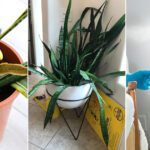Not all that glitters is gold, much like these deceptive weeds that look like tomato plants but are far from it!
Tomato plants are a staple in almost every garden. In fact, you might even stumble upon a wild one nestled among your greens. Yet, beware—there are deceiving weeds that look like tomato plants but might be just another invasive species that’s competing with the nutrients in your yard!
Weeds that Look Like Tomato Plants
1. Horse Nettle

Botanical Name: Solanum carolinense
Apart from a similar leaf shape, the horse nettle also showcases yellow and green berries that look like unripe tomatoes. However, this weed carries tiny white and purple flowers over the prickly stems that might give you the right signals.
2. Black Nightshade

Botanical Name: Solanum nigrum
Pupolar as the European black nightshade, this weed could easily fool someone with its young, green berries and hairy stems, which give it a passing resemblance to tomato plants. But unlike the nightshade veggie, you’ll find it popping up in neglected spaces and wastelands, which makes the difference quite obvious.
3. Groundcherry

Botanical Name: Physalis longifolia
Standing about 50 cm tall, the ground cherry often gets mistaken for cherry tomatoes because of its small, yellow fruits wrapped in dainty, lantern-shaped husks. While it looks similar, these fruits are a favorite in preserves and jams, setting it apart from your garden-variety tomato.
4. Jerusalem Cherry

Botanical Name: Solanum pseudocapsicum
The Jerusalem cherry, sometimes called the Madeira winter cherry or the vague winter cherry, could be confused with tomato plants due to its serrated leaves and colorful berries ranging from orange to bright red.
While it’s often grown for decoration, in some parts of South Africa, India, New Zealand, and Australia, it’s just another weed easily distinguished by its vibrant berries.
5. Eastern Black Nightshade

Botanical Name: Solanum ptychanthum
Eastern black nightshade features little green berries and hairy stems that might remind you of tomato plants at first. But as the berries age to a deep black, it’s clear this isn’t any tomato.
Plus, this weed is a common sight in disturbed areas and gardens, thriving where a tomato plant is least expected.
6. Bittersweet Nightshade

Botanical Name: Solanum dulcamara
With its red berries and growth habits that echo those of smaller tomato varieties, bittersweet nightshade could easily blend into a row of garden plants. However, its distinctive purple to blue flowers offer a clue that this isn’t your typical tomato plant.
If you see this weed growing along your garden fence, it’s another sign apart from the colorful flowers instead of tiny yellow ones.
7. Buffalobur

Botanical Name: Solanum rostratum
Buffalobur might catch your eye as it stands erect, reaching heights between 1/2 and 3 feet, with its spiny, hairy appearance like the tomato plants. In fact, the little yellow flowers might even remind you of tomato blooms.
But unlike tomatoes, which have a more sprawling growth, buffalobur grows distinctly upright.
8. Jamaican Nightshade

Botanical Name: Solanum jamaicense
First seen in Florida, the Jamaican nightshade quickly claimed wooded habitats where it dominated in isolated patches. A poisonous weed, the star-shaped flowers are very similar to that of tomato plants, and they even range in similar colors from white to pale yellow.
The berries further the resemblance, starting green and turning red upon ripening, though it’s definitely not a tomato!
9. Red Soda Apple

Botanical Name: Solanum capsicoides All.
With small, red fruits that resemble tomatoes to the T when ripe, you will surely confuse this plant with a tomato plant at least once! And the similarities don’t end there. This large-leafed, thorny plant also shows short hairs all over its stems, just like a tomato plant.
The only way to distinguish between the two is by paying attention to the tiny white blooms.
10. Litchi Tomato

Botanical Name: Solanum sisymbriifolium
With fruits that bear a striking resemblance to tomato plants thanks to their vibrant red color, the litchi tomato is quite an aggressive weed that has become invasive in several countries.
However, this aggressive weed, often found in plowed fields and wastelands, offers berries that taste more like tart cherries than tomatoes, distinguishing it from your garden-variety tomato.
11. Tropical Soda Apple

Botanical Name: Solanum viarum Dunal
Unlike its cousin, the red soda apple, the tropical soda apple doesn’t look quite as much like a tomato plant, despite the velvety, hairy, thorned stems it shares with tomato plants. Recognized as a pest in many regions, it’s definitely not something you’d want mixed up with your tomatoes.
12. Carolina Wolfberry

Botanical Name: Lycium carolinianum
Native to the southeastern U.S., Carolina wolfberry is often used for ornamental purposes or as ground cover due to its rapid spread. Its fleshy red berries and sweet taste are similar to tomatoes, but the lavender to blue flowers offer a clear visual cue to differentiate it from tomato plants.







